Airlines, Airports and Airliners 26 Sept to 2 Oct 2022
Compiled by Willie Bodenstein
Google Banner Ad
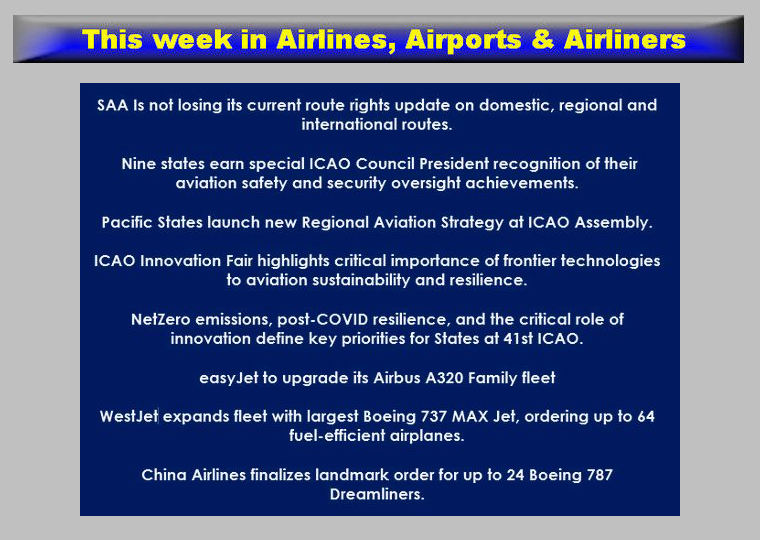
SAA IS NOT LOSING ITS CURRENT ROUTE RIGHTS UPDATE ON DOMESTIC, REGIONAL AND INTERNATIONAL ROUTES.

South African Airways (SAA) assures its customers that the airline is not losing its route rights. SAA continues to operate its current network and schedule with 6 regional and 3 domestic destinations. Currently, the airline has deployed additional capacity on the Cape Town route to meet demand and we have increased the aircraft size on the Harare route.
SAA made representation to the International Air Services Licensing Council (The Council) on its current route allocation and the decision by the Council to review some of the frequencies on the routes that the airline is currently not serving.
SAA continues to ramp up its operations by bringing in additional equipment into the fleet. The first addition arrived on 27th September 2022. SAA has taken delivery of an Airbus 320 which allows the airline to continue to gain momentum with the intention to resume full regional and international services.
There is no doubt that SAA still retains a high brand equity and customer loyalty, demonstrated by successfully operating six in-demand routes on our Continent, high occupancy rates on domestic routes, and robust increase of Voyager members.
In addition to SAA's own operations, customers can select to fly destinations with SAA's codeshare partners on Emirates, Air Mauritius, LAM Mozambique, Egyptair, Ethiopian, Singapore Airlines and Kenya Airways. All SAA and codeshare flights can be booked on the SAA website www.flysaa.com at competitive rates. Customers and voyager members can be assured that SAA will be adding more codeshare partners in the coming months.
SAA is a proud member of the 24 member airlines network, Star Alliance, which prides itself as being the world's largest global airline alliance. Star Alliance claimed World's Best Airline Alliance title at the Skytrax 2022 World Airline Awards. Overall, the Star Alliance network currently offers more than 10,000 daily flights to almost 1,200 airports in 184 countries. Further connecting flights are offered by Star Alliance Connecting Partners Juneyao Airlines and THAI Smile Airways.
NINE STATES EARN SPECIAL ICAO COUNCIL PRESIDENT RECOGNITION OF THEIR AVIATION SAFETY AND SECURITY OVERSIGHT ACHIEVEMENTS
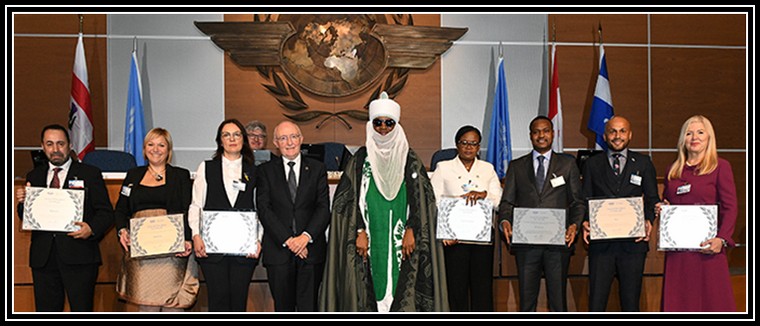
During the opening ceremony of the ICAO 41st Assembly this week, ICAO Council President Salvatore Sciacchitano recognised nine States' significant progress in improving safety and security oversight systems by awarding them with Council President Certificates.
These Certificates are awarded on the basis of the outcomes of ICAO's Universal Safety and Security Oversight Audit Programmes, which pertain to the effective implementation of ICAO Standards and Recommended Practices (SARPs) in these areas.
At this year's ceremony, ICAO presented Ethiopia, Fiji, Honduras, Slovenia, and Ukraine with certificates for their safety progress, while Serbia, and Tunisia were recognised for their achievements in regard to aviation security. Côte D'Ivoire received certificates for its progress in both aviation safety and aviation security.
The President of the Council also took the opportunity to acknowledge Nigeria's exceptional level of effective implementation of ICAO safety and security standards, one of the highest in the world, reflecting the organisation's “No Country Left Behind” initiative, with the ICAO support provided to States for the implementation of ICAO policies, global plans and SARPs.
The effective implementation of ICAO's global Standards and Recommended Practices by States is key to the optimisation and alignment of the 193 regulatory frameworks that govern international civil aviation. This in turn is critical to the safety and security of global aviation, which underpin its ability to act as a catalyst for sustainable development worldwide.
While normally issued annually, the presentation of these certificates was interrupted along with the rest of global aviation due to the pandemic. The 2022 ceremony therefore represented the reinstatement of this important global recognition programme.
Google Block Ad
PACIFIC STATES LAUNCH NEW REGIONAL AVIATION STRATEGY AT ICAO ASSEMBLY
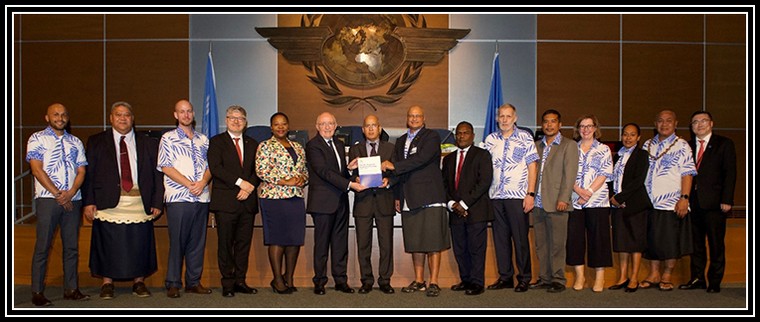
During a special ceremony today at ICAO's 41st Assembly, Pacific States officially launched a new Pacific Regional Aviation Strategy. The new Strategy is a major turning point for the Pacific Sub-region and will help its participating States work together more effectively with ICAO and the Pacific Aviation Safety Office (PASO) to assure the safe, secure and sustainable growth of regional air connectivity and socio-economic development.
“ICAO, especially through its Asia Pacific Regional Office, has actively engaged with the Pacific Small Islands Developing States through various activities promoting a closer working relationship between the Pacific Sub-region and ICAO,” commented ICAO Secretary General Juan Carlos Salazar, who was joined by H.E. the Hon. Walter Schaubelt, Minister of Transport of Papua New Guinea, the President of the Assembly Poppy Khoza and ICAO Council President Salvatore Sciacchitano.
“In particular, ICAO is pleased to have had the opportunity to contribute to the development of a number of key instruments, namely the Pacific Ministers Declaration and the Pacific Aviation Safety Office 10-year Pacific Regional Aviation Strategic Plan for 2022-2032,” Secretary General Salazar continued.
Following the ICAO 2019 Pacific Small Islands Developing States (PSIDS) Aviation Needs Analysis, an Implementation Roadmap was developed to guide ICAO efforts in the region. As countries continue to work to recover from the global pandemic, ICAO is focusing its efforts on capacity-building, implementation support activities and technical assistance to the PSIDS through complimentary delivery of ICAO's Implementation Packages (iPacks), in addition to the continued on-site technical assistance missions.
“A number of consultative meetings with the States in the Pacific-Sub region have taken place followed by technical assistance activities through virtual 'Combined Action Team' missions. In the same vein, the Pacific Small Islands Developing States also received complimentary virtual training courses,” Mr. Salazar emphasised.
He also noted the recent appointment of a dedicated ICAO PSIDS Liaison Officer, with the generous financial support contributed by Singapore and offers to host the new ICAO Officer being received from Fiji and Papua New Guinea.
In closing, Mr. Salazar emphasised ICAO's unwavering commitment to the PSIDS and to advance the achievement of ICAO's global Strategic Objectives for sustainable civil aviation growth in the Pacific.
ICAO INNOVATION FAIR HIGHLIGHTS CRITICAL IMPORTANCE OF FRONTIER TECHNOLOGIES TO AVIATION SUSTAINABILITY AND RESILIENCE
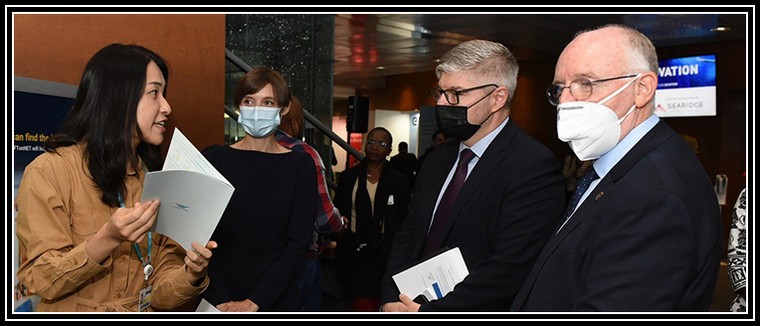
Demonstrating how emerging technologies can deliver a sustainable and resilient recovery for the international air transport system, the 2022 ICAO Innovation Fair has helped set the stage for the opening of the UN agency's 41st Assembly today.
Taking place in Montréal, this special three-day event attracted over 1,400 attendees, and featured traditional and new players who are delivering a technological revolution in aviation worldwide. An exhibition included prototypes of cutting-edge aircraft types and other latest air transport technologies and solutions, all of which were highly appreciated by the attending government and industry delegates.
Pointing to the pandemic recovery, climate change, digitalisation, and cybersecurity, as key priorities in his opening remarks, ICAO Council President Salvatore Sciacchitano underscored the critical importance of new technologies, materials and methods in driving the innovation now urgently needed for the decarbonisation and resilience of civil aviation.
“One of the key intentions of the ICAO 2022 Innovation Fair was to provide a prominent platform for innovations and initiatives that will contribute to a more resilient future for the air transport sector,” the President said. He highlighted that “the COVID-19 pandemic has led to proposals for numerous technical and policy solutions to help reconnect the world in its aftermath, but a more systematic approach to disaster risk identification and management will be necessary to circumvent the compound impacts of multiple disasters. This is a pre-requisite to building a resilient future for our sector.”
The 12 Innovation Fair Panels focused on different facets of innovation and their deployment for international civil aviation, addressing regulatory challenges, urban air mobility integration, aviation sustainability, incubator programmes, artificial intelligence, behavioural science, implementation support and capacity building. The second day of the Fair was specifically dedicated to aviation security and facilitation topics that hold the promise of secure, seamless and contactless travel.
Closing the Fair yesterday, ICAO Secretary General Juan Carlos Salazar celebrated the dynamic range of technologies and ideas that the event had explored and launched a youth-focussed innovation competition to highlight the pivotal importance of inspiring the next generation of aviation professionals in terms of achieving the objectives explored at the event.
“This year's Innovation Fair has highlighted an array of challenges in bringing aviation innovations from concept to reality, both for innovators and for regulators. Many of these factors are common across jurisdictions, and the panel discussions brought this to the fore,” Mr. Salazar said. “This highlights the need for regulators to operate in new and creative ways to productively engage with innovators, and new ways to communicate with a broader range of stakeholders.”
Google Banner Ad
NETZERO EMISSIONS, POST-COVID RESILIENCE, AND THE CRITICAL ROLE OF INNOVATION DEFINE KEY PRIORITIES FOR STATES AT 41ST ICAO.
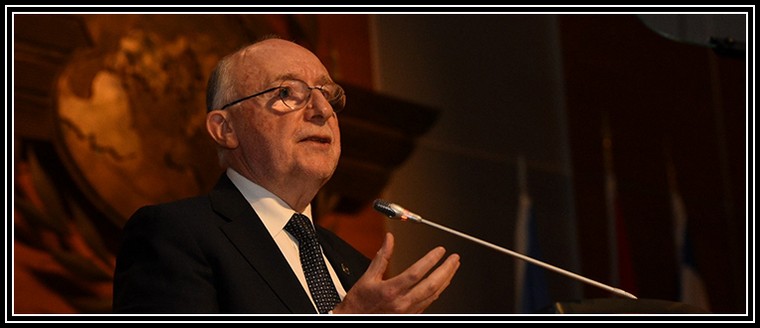
Some 2,000 Ministers and high-ranking government officials from 167 States gathered in-person and virtually at the Montréal Headquarters of the International Civil Aviation Organization (ICAO) today, for the launch of the UN aviation agency's 41st Assembly, the first since the COVID-19 outbreak.
They were joined by hundreds more participants, observers, and media attending the first-time hybrid Assembly, which runs through to 7 October with a key focus on the themes of aviation innovation and resilience, underpinning the continued sustainability of the air transport sector.
ICAO's Council President Salvatore Sciacchitano opened the ten-day event, being joined on the occasion by the Mayor of ICAO's host city of Montréal, Madame Valerie Plante, the Deputy Minister of International Relations and La Francophonie of the Province of Québec, Madame Sylvie Barcelo, and the Minister of Foreign Affairs for the Government of Canada, the Honourable Mélanie Joly.
In his opening remarks to the convened world air transport leaders, including States, NGOs, regional organisations, and global industry air transport associations, President Sciacchitano highlighted how ICAO has played a fundamental role in support of “the safe, secure and sustainable development of international air transport,” and stressed how aviation serves as a fundamental enabler of “the social, economic, and cultural development of countries through mobility and connectivity.”
ICAO Secretary General Juan Carlos Salazar also addressed the Heads of Delegations present, stressing that the past three years have had a “critical impact” on the aviation sector, and that the event would need to focus on priority areas including “the recovery and sustainability of air transport, agreements on CO2 emission reduction goals and ICAO's implementation support policy and Transformational Objective to better serve its Member States.”
ICAO Assemblies take place once every three years, and the main priorities this year have been largely driven by two recent ministerial conferences organised by the UN agency.
The latest of these was held this July to drive consensus on the need for a new global long-term goal for international air transport decarbonisation, while the earlier conference forged agreement on the post-COVID-19 priorities which countries are pursuing through ICAO for improved air transport system recovery and resilience.
On the topic of aviation carbon emissions elimination, President Sciacchitano emphasised to the gathered States that “mere aspirations are no longer sufficient where our climate and the well-being of our planet and its entire species are concerned,” urging them to come together over the next ten days on a new Net-Zero target.
On the topic of the post-pandemic recovery, he stressed that States and ICAO “cannot become complacent about the risk of future pandemics just because this latest one is now waning,” noting that this insight must inform the many decisions States will be presented with concerning the resilience of air transport in the coming decades.
Innovation is seen as key to how international flight will achieve both of these objectives and accordingly States will be deciding on wide-ranging priorities at the 41st Assembly concerning how passenger experience digitalisation, new aircraft and propulsion technologies, developments in sustainable aviation fuels and many other ongoing advances will be able to contribute to the improved environmental and operational sustainability of aviation in the coming decades.
President Sciacchitano acknowledged the importance of aviation getting more efficient at incorporating cutting-edge solutions, noting that “As international standard setters, we play a key role in assessing and enabling new technologies and in strategizing global collaboration and targets to realize evolutionary changes in civil aviation.”
As with all ICAO Assemblies, the 193 signatory States to the Chicago Convention will be working together at the 41st Session to agree on a new three-year work programme and budget for ICAO, as well as to elect the 36 countries who will serve on the Organisation's Governing Council for the 2023-2025 periods.
In a notable turn during a period when aviation gender equality is still a prominent goal among government and industry stakeholders, Delegates to the 41st Assembly elected its first ever female President, the Director General of Civil Aviation of South Africa, Ms. Poppy Khoza.
Ms. Khoza will be managing and facilitating the event's diplomacy and efficient decision-making on the key topics presently before States, as well as their review and adoption of the new editions of ICAO's Global Plans for Aviation Safety and Air Navigation Capacity and Efficiency, the evolution of the ICAO safety and security oversight audit programmes, and the enhancement of ICAO implementation support provided to States.
Additional topics for State consideration will centre around the integration of unmanned aircraft systems into traditional aviation airspace, the re-opening of air tourism markets and overcoming protectionist constraints to enable air operators to swiftly recover from COVID-19, digital travel documents and the deployment of interoperable health certificates using ICAO verification and many other issues surrounding future sectoral resilience and passenger security and convenience.
President Sciacchitano concluded his remarks by emphasising that the entire world has a vested interest in the results States would achieve together at ICAO's 41st Assembly, including the potential to achieve environmentally and economically sustainable international civil aviation.
Google Banner Ad
EASYJET TO UPGRADE ITS AIRBUS A320 FAMILY FLEET
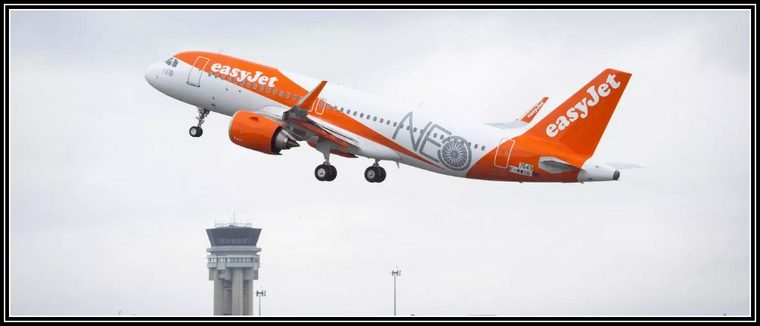
easyJet is to upgrade its A320 Family fleet with Airbus' “Descent Profile Optimisation” (DPO) - a fuel-saving enhancement to the aircraft's on-board Flight Management System (FMS) performance database and “Continuous Descent Approach” (CDA) to reduce noise impact on the ground. The European short-haul airline will become the biggest operator worldwide using these powerful combined solutions.
“While our ultimate ambition is to achieve zero carbon emission flying, we must continue our focus on reducing the carbon emissions in our operation each and every day. That's why this multi-million-pound investment is an important step in achieving a permanent reduction in the short-term which will see us operating the largest fleet of DPO and CDA enabled aircraft in the world. But one crucial element to reduce carbon emissions right now cannot be achieved by the industry alone, and so we are also calling on governments to introduce airspace modernisation right now, including finally implementing the Single European Sky,” said Captain David Morgan, easyJet's interim COO.
“We are very pleased that easyJet will equip its entire Airbus A320-family-fleet with these state-of-the-art technologies. Emission reduction in aviation is most successfully achieved as a team effort - aircraft manufacturers joining forces with airlines and air traffic management. By combining the use of DPO and CDA, easyJet will further reduce its fuel consumption while optimising the trajectory of all its flights,” said Wouter Van Wersch, Executive Vice President, Region and Sales Europe.
The DPO and CDA functions allow aircraft to descend from cruise altitude using only idle engine thrust. This reduces fuel consumption and associated CO2 and NOx (nitrogen oxide emissions) reductions as well as to noise. To further enhance fuel reduction and noise impact, DPO and CDA maximise the time spent at efficient cruise level -by not starting the descent too early and removing the 'level-off' stage at the bottom of the descent when the aircraft's engines generate thrust to maintain level flight in dense air prior to final landing approach.
Following the upgrade, which will be in place by the end of 2023, easyJet's entire fleet, of more than 300 Airbus A320-Family aircraft, will be equipped with DPO and additionally CDA for compatible aircraft.
Optimisation of the aircraft's flight trajectory is one of the key factors to further improve efficiency in cooperation with Air Traffic Control. By optimising the descent trajectories of its aircraft and reducing the fuel flow to the engines -arising from the lowest 'idle' thrust setting during the descent phase- thanks to the DPO and CDA functions, easyJet will save more than 98,000 kg of fuel per year per aircraft across its network in Europe. This will reduce CO2 emissions by over 311 tons per year per aircraft, or 88,600 tons of CO2 each year for the entire A320 Family fleet, representing a significant contribution to more sustainable flight operations.
DPO and CDA are just some of the several flight operations optimisation solutions offered by Airbus and its flight operations services subsidiary Navblue. Together with improved Air Traffic Management, these fuel savings and emissions reductions solutions enable operators to start aviation decarbonisation now.
Google Block Ad
WESTJET EXPANDS FLEET WITH LARGEST BOEING 737 MAX JET, ORDERING UP TO 64 FUEL-EFFICIENT AIRPLANES
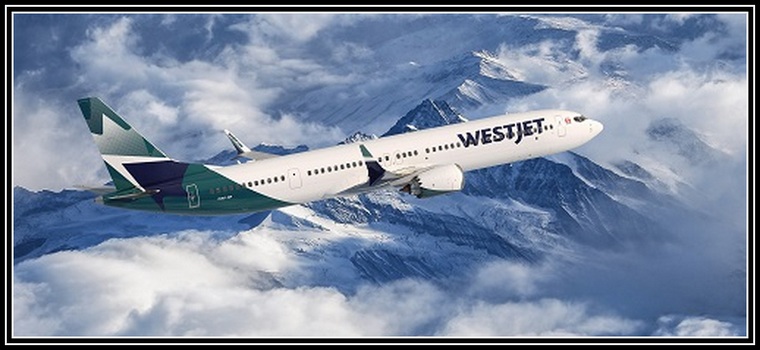
Boeing [NYSE:BA] and WestJet today announced the airline is strengthening its commitment to the 737 MAX family with an order for 42 737-10s and options for an additional 22 jets. With industry-leading fuel efficiency and reliability, the 737-10 will enable the Canadian carrier to undertake an ambitious network expansion and meet its long-term sustainability goals.
"The 737-10 will be a game changer, with one of the lowest costs per seat among mid-range aircraft. This will foster our low-cost positioning and affordability for Canadians," said Alexis von Hoensbroech, WestJet Group chief executive officer. "In addition, with its lower fuel consumption and reduced emissions, the 737-10 will further improve the environmental footprint of our fleet."
Since launching its business with three 737s in 1996, WestJet has grown its Boeing fleet to more than 100 airplanes including the 737-8 and 787 Dreamliner. Including the 737-10, the Calgary-based carrier has more than 60 firm orders for the 737 MAX family.
"The 737-10 will provide WestJet with additional capacity and unrivalled efficiency as the airline expands its network of destinations across Canada and around the world," said Stan Deal, president and CEO of Boeing Commercial Airplanes. "We are proud that WestJet sees the value of the 737 MAX family and is adding the 737-10 to complement the 737-8 for outstanding capability, flexibility and improved sustainability."
Each 737-10 will reduce CO2 emissions by millions of pounds per year compared to the airplanes it replaces, enabling greater sustainability. As Boeing's largest and most efficient single-aisle jet, the 737-10 seats up to 230 passengers with a range of 3,100 nautical miles. WestJet also has more than 15 737-8s in-service, carrying 178 passengers with a range up to 3,500 nautical miles. Together, the two models will enhance the airline's environmental performance for short- and medium-haul air travel.
With the expansion of its 737 MAX fleet, WestJet's order supports the growth of the aviation industry in Canada. The country is home to one of Boeing's largest international supply bases with more than 550 suppliers and partners. Boeing currently contributes CAD ~$5.3 billion in economic benefit to Canada annually, supporting more than 20,000 jobs. Boeing's Winnipeg fabrication site builds composite components for the 737 MAX and other Boeing models.
CHINA AIRLINES FINALIZES LANDMARK ORDER FOR UP TO 24 BOEING 787 DREAMLINERS

Boeing (NYSE:BA) and China Airlines announced they have finalised an order for up to 24 787 Dreamliners, as the carrier invests in the fuel-efficient widebody to expand passenger and cargo operations. The deal includes a firm order for 16 of the longest range 787-9 with options for eight additional jets, a landmark purchase that will enable the airline to meet its long-term sustainability goals.
"We are excited to introduce the 787-9 Dreamliner into our operations as we continue to upgrade our fleet with more modern, fuel-efficient airplanes. Adding the state-of-the-art 787 will help us reduce carbon emissions, while also providing our customers with unmatched levels of comfort," said China Airlines Chairman Hsieh Su-Chien. "Our continuous investment in fleet modernisation is the cornerstone of our sustainability efforts. The 787's best-in-class efficiency and low operating costs will allow us to expand our network for years to come."
The best-selling model of the Dreamliner family, the 787-9 will allow China Airlines to operate with the lowest trip cost among medium-sized widebodies, while reducing fuel use and emissions by up to 25% compared to airplanes it replaces. Since entering service in 2011, the 787 family's fuel efficiency, flexibility and range have enabled airlines to open more than 325 new nonstop routes and reduce carbon emissions by 80 billion pounds.
"The 787's superior fuel efficiency and range, combined with China Airlines' existing fleet of 777-300ERs, will enable the carrier to grow efficiently and also expand its global route network," said Ihssane Mounir, Boeing senior vice president of Commercial Sales and Marketing. "This is a milestone order in our continuing partnership with China Airlines, and the market-leading efficiencies of the 787 will play an important role in furthering the airline's sustainability efforts."
Powered by advanced engines and a suite of environmentally progressive technologies, the 787 family has an airport-noise footprint that is 60% smaller than the previous generation of airplanes. In addition, the 787's revolutionary composite structures resist corrosion and are perfect for operating in warm and humid climates served by Taipei-based China Airlines.
China Airlines now has 22 Boeing jets on order, including six 777 Freighters. The airline also currently operates 10 777-300ERs (Extended Range), which will form a highly efficient widebody fleet and complement its new fleet of 787s.
Google Banner Ad

|
                    |























